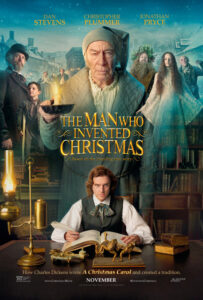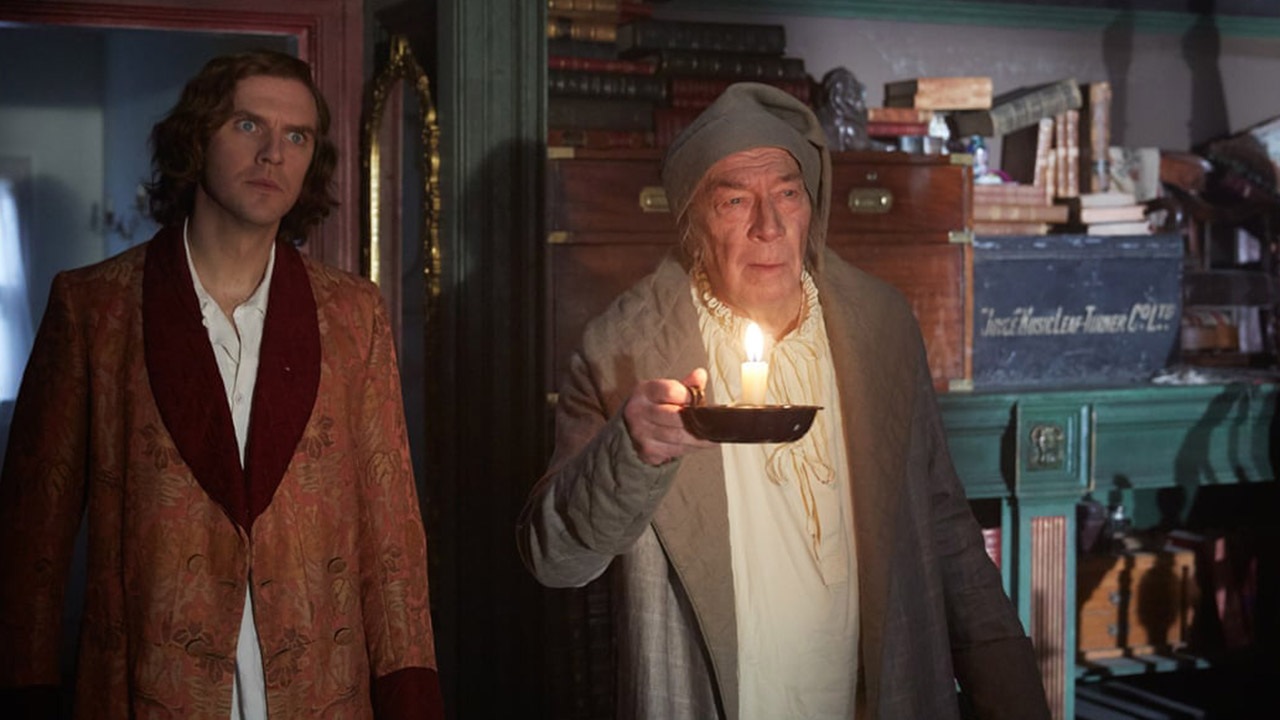The Man Who Invented Christmas (2017)
Film and Plot Synopsis
“The Man Who Invented Christmas” is a delightful biographical drama directed by Bharat Nalluri and released in 2017. The film offers a fictionalized account of the creative process behind one of the most beloved holiday tales of all time: Charles Dickens’ “A Christmas Carol.” Set in 1843 London, the story follows Dickens as he grapples with writer’s block, financial struggles, and personal demons while striving to craft a timeless masterpiece that will revive his career and capture the true spirit of Christmas.
‘The Man Who Invented Christmas’ Movie Summary
 The film opens with writer Charles Dickens (Dan Stevens) at a low point in his career. Despite achieving early success with his novels, including “Oliver Twist” and “Nicholas Nickleby,” Dickens finds himself in dire financial straits following a series of literary flops. Desperate to regain his former glory and provide for his growing family, he embarks on a risky venture to self-publish a new book, which he hopes will resonate with readers and restore his reputation as a master storyteller. Dickens places additional pressure on himself by promising that the book will be out by Christmas.
The film opens with writer Charles Dickens (Dan Stevens) at a low point in his career. Despite achieving early success with his novels, including “Oliver Twist” and “Nicholas Nickleby,” Dickens finds himself in dire financial straits following a series of literary flops. Desperate to regain his former glory and provide for his growing family, he embarks on a risky venture to self-publish a new book, which he hopes will resonate with readers and restore his reputation as a master storyteller. Dickens places additional pressure on himself by promising that the book will be out by Christmas.
However, Dickens soon discovers that inspiration does not come easily. Plagued by writer’s block and haunted by memories of his impoverished childhood, he struggles to find the right narrative hook for his latest project. Frustrated and disillusioned, Dickens grapples with self-doubt and creative stagnation, much to the concern of his loyal friend and agent, John Forster (Justin Edwards).
As the Christmas season approaches, Dickens finds himself increasingly consumed by thoughts of the holiday and its timeless themes of redemption, generosity, and goodwill towards others. Drawing inspiration from his own experiences and encounters with eccentric characters, Dickens begins to envision a tale centered around the transformative journey of a miserly old man named Ebenezer Scrooge (Christopher Plummer). Dickens draws criticism from many friends and publishers who tell him that the book will be a failure as Christmas (at the time) was considered irrelevant and a holiday that was celebrated by only a few people.
Fueled by a newfound sense of purpose and determination, Dickens immerses himself in the creative process, channeling his imagination and ingenuity to bring his characters to life. Along the way, he draws inspiration from the world around him, weaving elements of Victorian society, folklore, and personal reflection into the fabric of his narrative.
While writing his book, Dickens is unexpectedly visited by his eccentric father, John Dickens (Jonathan Pryce) and his mother, Elizabeth Dickens (Ger Ryan). Dickens views his father as immature and fiscally irresponsible. Dickens also blames his father for the time that Dickens had to spend working in a workhouse as a child after his father’s financial mismanagement resulted in the jailing of John and Elizabeth. Dicken’s workhouse experience continues to be an unresolved issue for the writer.
The mere sight of cows causes her actual, physical pain. John Dickens (Jonathan Pryce)
As Dickens delves deeper into his story, the boundaries between fiction and reality blur, and he finds himself engaging in lively conversations with his characters, including the cantankerous Scrooge, the jovial Bob Cratchit (Marcus Lamb), and the spectral guides of Christmas Past (Anna Murphy), Present (Justin Edwards), and Yet to Come (Fabiano Roggio). These imaginary dialogues serve as a catalyst for Dickens’ creative breakthroughs, allowing him to explore complex themes of regret, forgiveness, and the power of second chances.
As Dickens’ manuscript takes shape, he faces numerous obstacles, including skepticism from his publishers, financial pressures, and family tensions. However, with the unwavering support of his wife, Kate (Morfydd Clark), and the encouragement of his faithful servant, Tara (Anna Murphy), who helps him write the characters whenever Dickens losses inspiration, Dickens presses forward, determined to see his vision through to fruition. When Dickens shows Tara the latest draft, she is distraught that Scrooge would not save Tiny Tim (Pearse Kearney). Tara believes that people can change and suggests instead that Scrooge saves Tiny Tim. However, Dickens is steadfast in his belief that a man as cruel and cold as Scrooge could not change. He rejects Tara’s suggestion, but it continues to haunt him in the form of writer’s block.
The narrative gains momentum as Dickens races against the clock to complete his book in time for Christmas publication. Along the way, he draws inspiration from unexpected sources. However, Dickens’ relationship with his family and friends begins to deteriorate as he struggles with an appropriate ending for his book while dealing with a growing pile of debt. Ultimately, Dickens’ emotions boil over and he sends his parents and Tara out of the house in a fit of rage. The next morning, Dickens regrets sending Tara away, but he is unable to find her so that he can beg for her return. Kate tearfully confronts her husband over his instability and states that she believes that he puts his work before his family.
As Christmas Eve approaches, Dickens finds himself immersed in the final chapters of his story, culminating in Scrooge’s transformative journey of self-discovery and redemption. Through the character of Scrooge, Dickens confronts his own demons and grapples with the universal themes of compassion, empathy, and the power of redemption.
In a climactic sequence, Dickens confronts the specter of his own past, revisiting the workhouse that he spent many years at as a boy. Dickens confronts his character of Scrooge there and comes to realize that his experience as a child has affected his perception of the world. Through this cathartic experience, Dickens gains a newfound sense of clarity and purpose, reaffirming his commitment to his craft and his belief in the transformative power of storytelling. Dickens realizes that his story should be one of redemption and races home to rewrite the last few chapters. Just as he is set to leave to rush the book over to the printer, he learns that Tara has come to return a book that he lent her earlier in the film. Dickens apologizes for his angry outburst and hires her back. Dickens also invites his parents to come back to his home and stay with him for the holidays, having learned to forgive his father for his past transgressions.
The film concludes with the triumphant publication of “A Christmas Carol,” which is met with widespread acclaim and commercial success. Dickens’ literary masterpiece not only revitalizes his career but also captures the imagination of readers around the world, becoming an enduring symbol of hope, generosity, and the spirit of Christmas.
Rate the Film!
Our Rating
Elevation Pictures released The Man Who Invented Christmas on November 22, 2017. Bharat Nalluri directed the film starring Dan Stevens, Jonathan Pryce, and Christopher Plummer.
